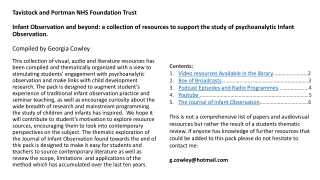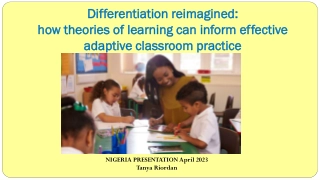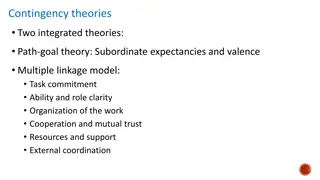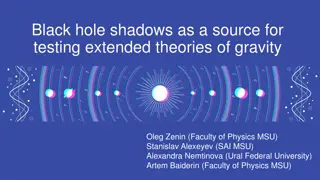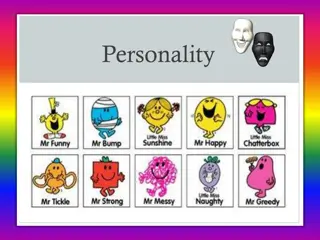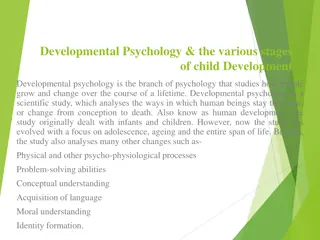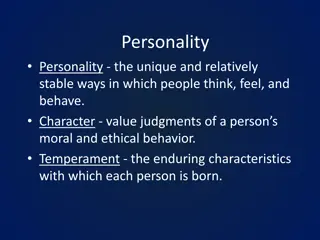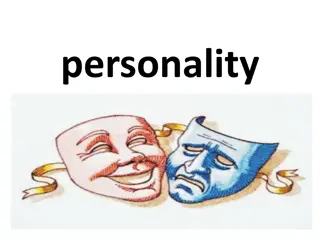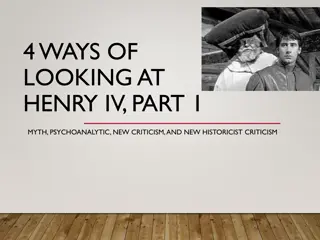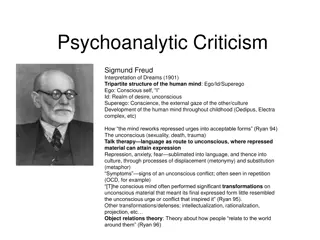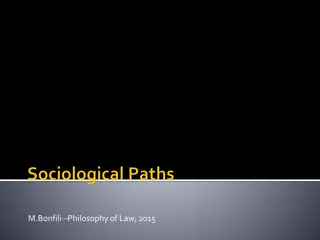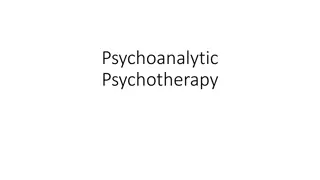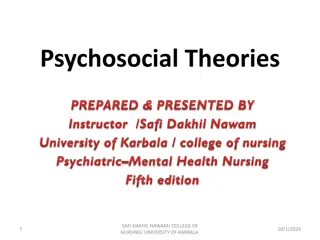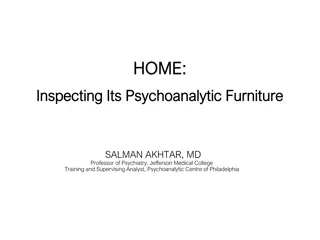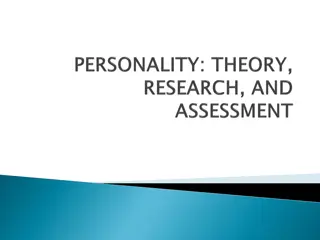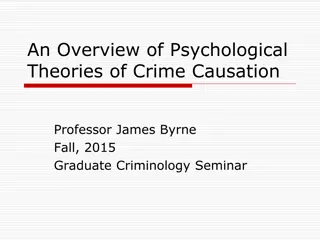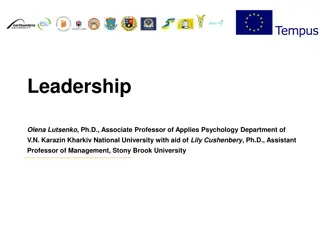Exploring Psychoanalytic Infant Observation: A Resource Collection
Discover a curated collection of visual, audio, and literature resources compiled to enhance the study of psychoanalytic infant observation and its relation to child development. This resource pack aims to engage students with contemporary perspectives, encourage exploration of research sources, and
0 views • 33 slides
Reimagining Differentiation: Enhancing Classroom Practice Through Learning Theories
Explore how theories of learning can inform effective adaptive classroom practice, focusing on the concept of differentiation. The presentation delves into reimagining differentiation, key theories supporting it, and practical strategies to support differentiation in language classrooms. The researc
0 views • 35 slides
Leadership Theories and Power Dynamics in Organizations
Explore contingency theories, dyadic theories, power and influence concepts, and leadership lessons from "12 Angry Men". Dive into the significance of leader-member exchange (LMX), political skills, and the interplay between power, politics, and organizational efficiency.
0 views • 27 slides
Theories Explaining Deviant Sexual Behavior Throughout History
Explore historical theories on deviant sexual behavior, including demonological, anomie, psychoanalytical, human ecology, and somatotyping theories. These theories range from supernatural beliefs of possession to scientific interpretations of societal influences and individual characteristics.
2 views • 33 slides
Testing Extended Theories of Gravity Using Black Hole Shadows
Exploring the shadows of black holes as a method to test extended theories of gravity, this study discusses the existence of black holes, gravitational wave astronomy, and direct imaging. Researchers Oleg Zenin, Stanislav Alexeyev, Alexandra Nemtinova, and Artem Baiderin present findings on black ho
5 views • 18 slides
Insights into Theories of Motivation and Their Application
Motivation, a driving force behind human behavior, is explored through various theories like Maslow's hierarchy of needs, McClelland's learned needs theory, and others. Understanding these theories can help organizations enhance worker productivity by addressing different motivational factors.
9 views • 21 slides
Understanding Key Nursing Philosophies and Theories
Explore the development of nursing philosophies and theories with a focus on prominent figures like Henderson, Orem, Roy, Rogers, Leninger, and Pender. Delve into the historical stages of philosophical development in nursing and the three schools of thought in nursing. Engage in group discussions an
10 views • 12 slides
Understanding Business Ethics Theories and Principles
Explore various business ethics theories including Ethical Concepts, Moral Behavior Development, Ethical Principles, and the Role of Ethics in Business. Delve into the concept of ethics, moral behavior evolution, ethical principles like autonomy, honesty, justice, and integrity, and the importance o
10 views • 17 slides
Managerial Theories and Criticisms
Delve into the world of management theories, from classical to modern approaches, exploring the foundational principles of management, the evolution of theories, and criticisms of traditional perspectives. Learn about the basic functions of management and the insightful perspectives of renowned theo
2 views • 11 slides
Understanding Personality: Theories, Types, and Assessment
Exploring the intricate world of personality, this comprehensive guide delves into major theories of personality development, assessment methods, cultural influences, and key contributors. Discover the different types of personalities, including Type A and Type B, and unravel the complexities of psy
0 views • 96 slides
Understanding Developmental Psychology: Various Stages of Human Development
Developmental psychology is a scientific study analyzing how individuals evolve from infancy to old age. It encompasses physical and psychological processes, problem-solving, language acquisition, moral understanding, and identity formation. Major theories like psychoanalytic, behavioristic, and cog
0 views • 10 slides
Understanding Personality: Freud's Psychoanalytic Theory
Personality encompasses unique ways individuals think, feel, and behave. Sigmund Freud's psychoanalytic theory explores the divisions of consciousness, parts of personality (Id, Ego, Superego), and stages of personality development. Freud's theory delves into the role of unconscious thoughts, desire
1 views • 41 slides
Understanding Personality: Theories and Components Explained
Personality is the unique and enduring characteristics that define individuals, influencing their behavior consistently over time. Explore the origins of personality from the Latin word 'persona' meaning 'mask', and delve into major perspectives such as psychoanalytic, trait, humanistic, and social-
1 views • 45 slides
Introduction to Organizational Behavior: Management Theories and Practices
Explore the evolution of organizational behavior from early management theories to contemporary practices. Understand the historical foundations and relevance of management theory in shaping workplace dynamics. Delve into key concepts like Scientific Management, Administrative Management, Bureaucrat
1 views • 28 slides
Psychological Theories of Criminality: Understanding the Roots
Psychological theories of criminality delve into the association between intelligence, personality, learning, and criminal behavior. Major theories include Psychodynamic Theory by Freud, Behavioral Theory by Bandura, and Cognitive Theory by Kohlberg. These theories explore how unconscious mental pro
1 views • 20 slides
Understanding Psychological Theories of Criminal Behavior
Psychologically-based criminologists attribute criminal behavior to individual factors such as negative early childhood experiences and inadequate socialization, leading to criminal thinking patterns and incomplete cognitive development. Probation and parole practices are influenced by rehabilitatio
0 views • 30 slides
Exploring Leadership Theories: Traits and Behaviors
Leadership theories have evolved from trait theory focusing on personal qualities to behavioral theories emphasizing actions and interactions. While early research sought universal traits for leadership, it encountered challenges due to varied traits among leaders and non-leaders. Behavioral theorie
2 views • 29 slides
Understanding Dreams: Exploring Theories and Meanings
Dreams have intrigued philosophers for centuries, with recent scientific research shedding light on their significance. While the purpose of dreams remains debated, various theories like Freud's psychoanalytic perspective offer insights into how dreams may be linked to our subconscious desires and t
0 views • 9 slides
Unraveling COVID-19 Conspiracy Theories and Hoaxes
Exploring various conspiracy theories surrounding the origins of COVID-19, from bat soup to bioweapons and espionage. Dive into wilder theories involving population control, world war, and even Disney's supposed predictions. Understand the differences between conspiracy theories and hoaxes, shedding
2 views • 11 slides
Understanding Sociological Theories and Frameworks
Sociological theories, encompassing micro and macro perspectives, provide a lens to interpret societal dynamics. Consensus theories like functionalism emphasize shared norms, while conflict theories such as Marxism highlight social inequalities. Social action theories like interactionism focus on in
3 views • 21 slides
Online Seminar: Theories of Learning in Initial Teacher Education
This collection of online seminar slides introduces pre-service teachers to major theories of learning, including the Science of Learning through cognitive neuroscience. The presentation aims to help educators consider implications for teaching, recognize theories in action, and pose critical questi
1 views • 11 slides
Exploring Different Perspectives on Henry IV, Part 1 Through Myth, Psychoanalytic, New Criticism, and New Historicist Criticism
Delve into various critical lenses such as myth, psychoanalytic, New Criticism, and New Historicist Criticism to analyze Henry IV, Part 1. Uncover the mythic origins of characters like Falstaff, connections to ancient rituals, and the symbolism of killing the king. Discover how literature intertwine
4 views • 26 slides
Theories of Causation in Psychological and Social Sciences
Overview of theories of causation categorized into psychological, social psychological, and sociological perspectives. Psychological theories focus on instinctive, biological, and psychological qualities of abusers, including Attachment Theory, Psychodynamic Theory, Social Learning Theory, and Situa
0 views • 15 slides
Introduction to Quantum Chromodynamics & Field Theories in High-Energy Physics
Explore the fundamentals of Quantum Chromodynamics and Classical Field Theories in this informative lecture, covering topics such as global and local symmetries, Lagrangians, actions, and dynamics. Understand the significance of global and local symmetries in classical field theories, along with exa
2 views • 17 slides
Comprehensive Overview of Student Affairs Theories
This collection explores key theories in student affairs, including cognitive-structural theories, learning theories, and person-environment theories. Cognitive-structural theories delve into how individuals process information, while learning theories examine how people absorb knowledge. Person-env
3 views • 19 slides
Understanding Theories and Concepts in Research
The content delves into the fundamental concepts of theories and variables in research. It discusses the nature of theories, including descriptive, explanatory, and predictive theories. Additionally, it examines the role of concepts in providing identity and meaning to objects and phenomena. Through
1 views • 55 slides
Classical Trade Theories and Their Limitations in International Economics
Classical trade theories such as the Theory of Absolute Advantage by Adam Smith and the Theory of Comparative Advantage by David Ricardo highlight the benefits of free trade and specialization based on natural advantages. However, these theories have limitations, such as the inability to explain sce
0 views • 8 slides
Applying Theories and Models in Integrated Health: Module 3 Overview
This module delves into the application of various theories, perspectives, and practice models in integrated healthcare. Students will learn to utilize different theories to enhance their understanding and practice in integrated health, focusing on aspects like personal impact, behavioral change the
0 views • 78 slides
Overview of Psychoanalytic Criticism and Object Relations Theory
Psychoanalytic Criticism, originating with Sigmund Freud and further developed by Melanie Klein and Jacques Lacan, explores the intricate workings of the human mind, delving into the tripartite structure of the ego, id, and superego. The theory encompasses concepts such as the interpretation of drea
0 views • 10 slides
Understanding Gender Socialization Theories and Impact on Identity Formation
The discussion delves into the criticism of naturalistic paradigms in understanding gender identity, emphasizing the societal role in shaping individual perceptions. It explores three theories of gender socialization - Psychoanalytic theory, Social learning theory, and Cognitive developmental theory
0 views • 62 slides
Accelerating Lemma Learning Using Joins in Satisfiability Modulo Theories
Explore the use of joins in accelerating lemma learning within the context of Satisfiability Modulo Theories (SMT). The study covers various SMT applications at Microsoft and delves into the development of the Z3 solver. Key topics include theories, arithmetic operations, array theory, uninterpreted
0 views • 25 slides
Understanding Psychoanalytic Psychotherapy
Psychoanalytic psychotherapy aims to increase adaptive functioning by reducing symptoms, resolving conflicts, and fostering self-reflection. The therapy involves making the unconscious conscious, strengthening the ego, and exploring childhood experiences to increase self-awareness. Therapists mainta
0 views • 63 slides
Theories and Concepts in Semantics: Classical vs. Prototype Approaches
Explore different theories of concepts in semantics, including classical theories based on necessary and sufficient conditions, causal theories, and prototype theories. Compare their strengths and limitations in handling fuzziness, asymmetry, and internal structure of concepts. Discover how experime
1 views • 46 slides
Integrating Theories and Models for Enhanced Health Practice
Explore the application of theories, perspectives, and practice models in integrated health through Module 3. Learn how theories guide assessment, treatment, and patient outcomes. Discover common theories enhancing assessment and supporting individuals through grief and loss. Gain insights into the
0 views • 78 slides
Comprehensive Overview of Leadership Theories and Styles
Leadership encompasses the ability to influence a group towards achieving goals by knowing oneself, communicating vision, building trust, and taking effective action. Various leadership styles include Autocratic, Democratic, Free-Rein, and Paternalistic, each with distinct decision-making approaches
0 views • 19 slides
Overview of Psychoanalytic Theories in Psychiatric Mental Health Nursing
Explore the fundamental beliefs and treatment modalities of psychosocial theories such as psychoanalytic, developmental, behavioral, existential, and crisis intervention. Learn about the influence of these theories on current nursing practices, with a focus on the foundational contributions of Sigmu
0 views • 40 slides
Reflections on the Significance of Home in Psychoanalytic Theory
Explore the intricate connections between the concept of 'home' and psychological well-being through the lens of psychoanalytic theory. From Freud's views on the symbolic nature of home to Winnicott's emphasis on the role of the environment in shaping one's sense of security, delve into the profound
0 views • 10 slides
Understanding Personality: The Freudian Perspective
Personality refers to an individual's unique behavioral traits, which can be categorized into specific traits like openness, conscientiousness, extraversion, agreeableness, and neuroticism. Various theories, including Freud's psychoanalytic theory, attempt to explain personality by focusing on uncon
0 views • 24 slides
Psychological Theories of Crime Causation: An Overview
Psychological theories of crime causation explore factors such as psychological development, childhood experiences, socialization, and individual characteristics that contribute to criminal behavior. These theories delve into the influence of mental disorders, personality traits, and psychoanalytic
0 views • 16 slides
Understanding Leadership Theories and Styles
Leadership involves influencing a group towards a common goal. Traits, interaction styles, and group dynamics play vital roles in effective leadership. Various theories, such as Trait Theories and Synthetic Leadership Theories, provide insights into different aspects of leadership. Understanding lea
0 views • 41 slides
